State-of-the-art oceanographic and fishery research vessel launched in Morocco: Backing Africa's fisheries industry through 40 years of cooperation
2021.03.25
In December last year, the state-of-the-art oceanographic and fishery research vessel built at a shipyard in the city of Tamano, Okayama Prefecture, with the cooperation of JICA, departed for its homeport of Agadir, Morocco. It arrived there on March 14.
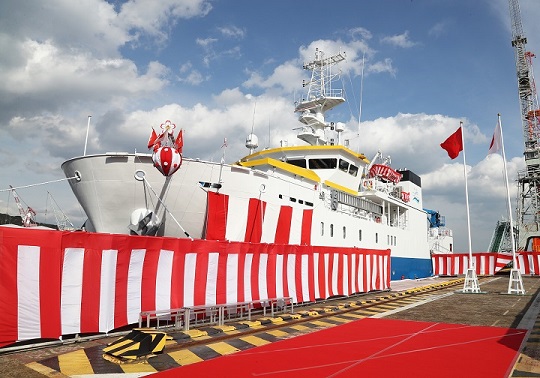
The inauguration ceremony of the newly commissioned oceanographic and fishery research vessel (48.5 meters long and 1,238 gross tons). The vessel was built with JICA cooperation and will facilitate highly accurate surveys of marine and fisheries resources
For approximately 40 years, JICA has been providing wide-ranging cooperation to the Moroccan fisheries sector. Today, Morocco has become a leader in promoting the development of Africa's fisheries sector, as it has taken the initiative in providing cooperation to other Sub-Saharan African countries by utilizing the knowledge gained from past cooperation with JICA.
In fact, about 20-30% of octopus imported to Japan comes from Morocco, as well as many other popular fishery products such as tuna and squid. The octopus used to make delicious Takoyaki (octopus balls) and sashimi is shipped from the distant waters of Morocco, and Japan is cooperating with Morocco in the management of its fisheries resources. Japan's fishery cooperation benefits the local fisheries industry, and this industry contributes to the Japanese daily diet.
IKEDA Makoto, a JICA expert who is cooperating with the Division of Strategy and Cooperation, Department of Marine Fisheries in Morocco to promote the fisheries industry, explains, “In Morocco, which boasts the largest fish catch in Africa, about 95% of the catch comes from coastal and artisanal fisheries. The country is similar to Japan in that there are many small-scale fishers.”
In addition to the global issues of conservation of the marine environment and research and management for sustainable use of fisheries resources, Morocco is currently focusing on its domestic priorities such as 1) sustainable use of resources, 2) improvement of quality of fishery products, and 3) enhancement of competitiveness by adding value. Mr. Ikeda is working together with local government officials on conducting interviews and formulating plans.
“In Morocco, many coastal and artisanal fishers catch small pelagic species of fish such as sardines. It is very important to conduct continuous oceanographic and resources surveys because the abundance of these species fluctuates greatly due to changes in the marine environment. Since fish have no national borders and migrate to the coasts of neighboring Mauritania and Senegal, we expect that the data from this advanced research vessel will benefit not only Morocco but also a wide range of West African countries,” says Mr. Ikeda, expressing his high expectations for the new research vessel.
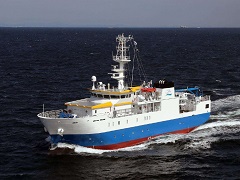
The newly built oceanographic and fishery research vessel is equipped with the latest fish detection and seafloor topography equipment and boasts the latest technology to reduce noise and vibration from engines and propellers (photo courtesy of Mitsui E&S Shipbuilding Co. Ltd.)
Morocco and Japan have a long history of cooperation in fisheries, dating back to 1979. Since then, JICA has continued to provide cooperation covering all aspects of Morocco's fisheries industry, including the provision of fishery training vessels and machinery, technical training, promotion of coastal and artisanal fisheries, development of fish landing facilities, and research on fisheries resources. Morocco and Japan have a long-standing tradition of friendly relations in the field of fisheries.
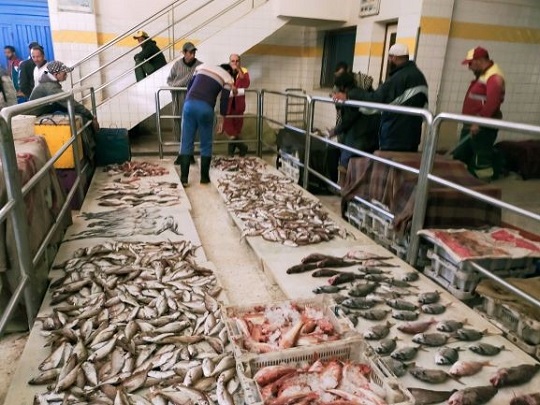
An auction at a fish landing facility in Suira Kedima. JICA has been providing a wide range of cooperation, from the development of fish landing facilities and the promotion of coastal and artisanal fisheries to marine research and surveys. The importance of fisheries resources management is increasing every day
Under such circumstances, Mr. Ikeda took over from the previous JICA expert and has been involved since last year in developing plans to enhance the fish landing facilities, which were built in the past with the cooperation of JICA. He explains, “The fish landing facilities must improve its hygiene management required by the export market, develop new economic activities such as tourism, and cope with the increase in the number of users compared to the assumptions made when the facilities were built. We are currently discussing these issues with administrative officials from the Department of Marine Fisheries and others involved in this field.”
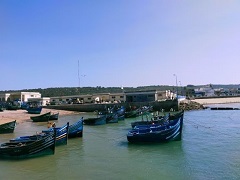
The fish landing facility at Suira Kedima is also equipped with ice making machines and a fishing gear warehouse. With the cooperation of JICA, a total of four fish landing facilities have been constructed: two on the Atlantic side of Morocco and two on the Mediterranean side
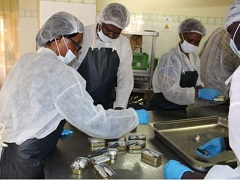
A third-country training program held in Morocco, inviting officials from neighboring countries
Morocco, which is now the largest fishery country in Africa, has a long history of South-South cooperation (Note 1) in the field of fisheries. In this context, JICA has been supporting Third Country Training Program (Note 2) in Morocco since the 1990s.
Note 1: Among developing countries, a country with advanced development in one field supports the growth of another developing country.
Note 2: A program to support mutual learning among developing countries.
Mr. Ikeda describes the potential of the Moroccan fisheries industry and its capabilities as follows.
“I was previously involved in the promotion of the fisheries sector in Senegal for about seven years. At that time, I had the opportunity to talk with fisheries administrators from Sub-Saharan African countries. I heard more than a few of them say that they had built a new system in their own countries based on their experience of participating in a Third Country Training Program in Morocco. I felt that Japan and Morocco cooperation bore fruit. Also, when I present ideas to the Moroccans, they use them as hints to come up with new ideas adapted to the actual situation on the ground, which gives me the impression that they are very flexible and imaginative. I feel that these Moroccan characteristics are being used to promote the fisheries industry.”
He added, “JICA is starting new technical cooperation in Morocco for the development of shellfish and seaweed aquaculture with a focus on environmental harmony and rural development. Due to the impact of COVID-19, we have been forced to cooperate remotely online, which is very frustrating. We hope that the coronavirus pandemic will be brought under control as soon as possible.”
According to the Food and Agriculture Organization of the United Nations (FAO), in some countries in Africa, along with Japan and other Asian countries, fish accounts for more than 20% of their consumption intake of animal protein. From the construction of the new oceanography and fishery research vessel to the planning of fish landing facilities undertaken by Mr. Ikeda, each facet of fishery cooperation enriches local meals and economies. These facilities are deeply connected to the goal of conserving marine and fisheries resources and using them in a sustainable manner.
scroll